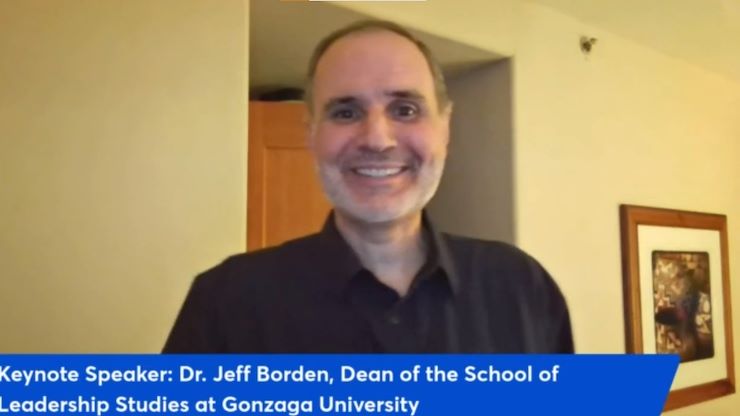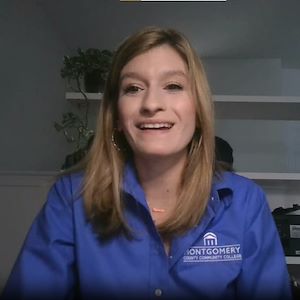
Dr. Jeff Borden was the keynote speaker during the 29th annual Montgomery County Community College Technology and Learning Conference online Friday, Sept. 29. Photos by Eric Devlin.
The transformative future of technology and its impact on the classroom experience was explored in depth recently, as Montgomery County Community College hosted its 29th annual Technology and Learning Conference Friday, Sept. 29.
The entirely virtual conference included sessions on artificial intelligence, virtual reality and accessibility with a theme of innovation in the classroom.
“As we kick off today’s conference, I’d like to extend Mustang greetings to more than 605 individuals who are joining us from around the globe,” said MCCC President Dr. Victoria L. Bastecki-Perez during the welcoming remarks. “Spanning 15 countries including Australia, Belgium, Cambodia, Canada, Greece, India, Indonesia, Ireland, Israel, Mexico, the Netherlands, Pakistan, South Africa and the United Kingdom, as well as across the United States.”
Under the leadership of Dr. Celeste Schwartz, Vice President of Pottstown Campus, Information Technology and Institutional Effectiveness, the conference has continued to evolve each year, providing “engaging opportunities for discussion and educational growth around pedagogy and emerging technologies,” she said.
The conference was intentionally held on Sept. 29, Dr. Bastecki-Perez said, in order to commemorate its 29th anniversary, “marking nearly three decades of offering this now complimentary, informative conference at our college, community and the world.”
“This year’s conference features a wonderful keynote speaker, panel discussions, workshops and networking opportunities that will help you learn from experts and peers, share best practices and discover new solutions,” said Dr. Schwartz. “I hope you will find this conference informative, engaging and inspiring.”
Dr. Schwartz, who has opened the conference each of its 29 years, noted that all but two words of the first paragraph of her opening remarks were written by artificial intelligence through Microsoft Bing Chat.
“I must say that the use of AI to compose writing for me was an odd experience,” she admitted. Some of the prior versions of the paragraph, she said, weren’t written in her voice and she had to make changes. “Like so many technologies in the past, however, I am convinced that it will soon become commonplace to leverage artificial intelligence in many facets of our life. In fact, it may someday feel odd not to have an AI assistant available to assist us.”
Technological change brings “a sense of uneasiness and AI may raise the bar to the degree to which we are collectively uncomfortable.” Over the last 29 years, the community of technology users has seen many novel uses of technology, she said.
“The purpose of this conference is to showcase new applications of all technologies, that aid in the success of faculty and students,” she said. “I hope you find content through today’s session that does just that.”
This year’s conference keynote speaker was Dr. Jeff Borden, the Dean of the School of Leadership Studies at Gonzaga University. His presentation focused on creating a culture of learning innovation.
Higher education as a whole needs to do a better job of innovating, even if it resists doing so. He argued that higher education should be more willing to hire employees from outside its sphere, and if it can’t do that, it should “at least seek help from areas outside of higher ed, just to see how they’re fixing problems.”
“If we don’t know how other people are solving issues,” he said, “then we’ll unfortunately try solving issues the same way that every other higher education institution has tried to solve issues, which we can see a road littered with failed experiences over and over again.”
Innovative organizations also seek the root causes and measure their problems correctly. In higher education, student dropout rates, for example, are typically measured by grades and attendance. Yet in 2019, 7 percent of students reported dropping out of college because they were lonely, said Dr. Borden
“We have problems that are underlying what’s going on in our sector that we don’t even measure,” he said.
Higher education institutions need to evolve into hubs where students can train throughout their lives through upskilling, reskilling and changing career pathways. Lectures need to evolve because student brain activity measures show students’ brains are least active during lectures.
“This becomes part of the conundrum we’re in,” he said. “Innovation that leads to transformation is not about technology. It’s about change management.”
This year’s conference featured a wide variety of topics. Katherine Kellen, of Seminole State College of Florida, led a session, for example, called “Re-imagining Assessment: Evaluating Learning in Novice College Writers Post-AI Language Model Ubiquity,” which addressed student comprehension with writing assignments in the age of AI. Julie Taylor, of Pymble Public School of Australia, led a session called “Authentic Life Experiences through the Creative Use of Augmented Reality,” which focused on how she incorporated augmented reality technology into her second-grade classroom. Teresa Hudson, from West Chester University, led as session called “Sustainable IT Practices in our Teaching/Learning and Work Spaces,” which looked at West Chester’s sustainability efforts within its IT operations, infrastructure, cybersecurity, and teaching and learning spaces.
Conference gold sponsors Pathify, InSpace and InScribe each presented sessions of their own. Pathify led a session called “Evolution of Community in Hybrid Campuses,” which focused on how to nurture community inside a one-stop digital environment. InSpace’s session “From Flipped Classroom to Flipped Campus: Creating Value in Virtual Experiences,” examined how leaders from three higher education institutions across the country flipped orientation, faculty office hours, and other student support services to foster meaningful interactions online. Inscribe’s session, “The Power of Belonging: Strategies for Fostering Connection and Engagement,” looked at the importance a sense of belonging plays in student success and how institutions can increase student connectedness.
 MCCC faculty, staff and administrators led several presentations of their own. “Insight
from our Students: Identifying trends through gathering qualitative feedback” focused
on MCCC’s Sustainability User Board, which actively recruits students to weigh in
on projects Information Technology is working on to help better serve students.
MCCC faculty, staff and administrators led several presentations of their own. “Insight
from our Students: Identifying trends through gathering qualitative feedback” focused
on MCCC’s Sustainability User Board, which actively recruits students to weigh in
on projects Information Technology is working on to help better serve students.
“User feedback matters. Students are our primary users,” said Angela Cavaliere, Assistant Director of Digital Experience.
In ‘Combating Speech Anxiety Through Virtual Reality,” Communication Studies Assistant Professor Meredith Frank and Academic Technologies Innovation Specialist Matt Kilbride gave a presentation about a pilot program at the College, which allows students to wear a virtual reality headset during Frank’s public speaking courses to help them build confidence in presenting in front of their peers.
“Feedback from students has been really positive,” said Frank, who said many students felt more comfortable when they couldn’t see their classmates and it helped them to relax.

In “Empowering Industry Education Partnerships,” Kyle Longacre, Dean of Workforce and Economic Development, and Kimberly Springfield, Instructional Designer, talked about how they were part of a team that created two eBooks for the Baker Center of Excellence for Employee Ownership and Business. These two eBooks are entitled "ESOP Basics" and "A Manager’s Introduction to Employee Stock Ownership Plans (ESOPs)." The MCCC team designed the eBooks as flexible resources to accompany facilitated training sessions that could be modified for course training, affinity groups, or contract training with a company. Completion of these trainings could then be transferred to college credit toward a credential or associate degree using Prior Learning Assessment. Participants were encouraged to consider using similar eBooks designs to help facilitate industry/education partnerships in their local communities.
In “Generative AI in Higher Education: A Conversation Café,” Kilbride, along with Kevin Strunk, Reference Librarian and Associate Professor, Kara Groschopp, Librarian, and Dr. Kendall Martin, Computer Science Professor, led an open forum discussing artificial intelligence and its potential applications.
Dr. Martin said a lot of the concerns surrounding AI feel familiar.
“There’s a familiarity with when online learning and the internet came up,” she said. “People said there’s no innovation, students will plagiarize, there’s no higher cognitive function, critical thinking is gone, it won’t foster creativity. All of those emotions around major changes we’ve seen around major changes in our sphere before.”
Other MCCC led sessions included “Neither sap nor skeptic; Information literacy exercises for a generative AI-charged research landscape” led by Strunk; “Revolutionizing the Dance Education Experience,” led by Clyde Evans, MCCC Dance Lecturer and Hilary Palanza and Jason Waskey, of the International Museum of Dance; “How to Use Starfish to Enhance Your Relationship with Your Students,” led by Stefanie Crouse, Academic Advisor and Associate Professor, Mary Beaver, Director Enterprise Software Systems, and Kimberly Liberty, Enterprise Software Analyst; “Microsoft 365 for Managers” led by Ayhan Usein, IT Manager & Business Technologies Specialist; "Beyond the Letter: Strategies for Enhancing Accessibility in the Online Classroom" led by Kristen Jensen, Instructional Designer; and “DNA Virtual Reality in a CAVE (Cave Automated Virtual Reality)” led by Laurence Elias, Computer Science Senior Lecturer.
For more information about the Technology and Learning Conference, visit the landing page.
Updated: 10/20/2023
